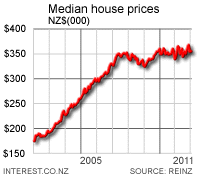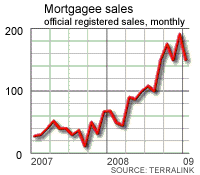 By Bernard Hickey The New Zealand Herald led this morning with a report on Westpac Economist Doug Steel's comments at Auckland's regional job summit yesterday, where he said housing now represented 'fair value.' (Update 1 to include Westpac slides.) I've asked for the full research that his comments are based on and will update this opinion piece once I have it, but here's the gist of his argument.
By Bernard Hickey The New Zealand Herald led this morning with a report on Westpac Economist Doug Steel's comments at Auckland's regional job summit yesterday, where he said housing now represented 'fair value.' (Update 1 to include Westpac slides.) I've asked for the full research that his comments are based on and will update this opinion piece once I have it, but here's the gist of his argument.
Westpac economist Doug Steel told an Auckland regional job summit yesterday that house prices were now "around fair value" based on rents, interest rates and other costs. "The negative sentiment towards housing is overblown," he said. "That's not to say everyone should leap into the housing market. Our view for house prices is that they will drop by 5 per cent in 2009 and stay flat in 2010, but I think that is more positive than many." On Westpac's calculations, based on rents averaging $11,400 a year ($219 a week) and a five-year mortgage rate of 6.75 per cent, an investor on the top tax rate should be willing to pay $332,000 for the average house. Westpac says the rolling average of sales in the past three months was $325,000, noticeably under the "fair value". The bank assumes that the Government will go ahead with its election promise to cut the top tax rate on incomes over $70,000 a year from 39 per cent now to 38 per cent next week and 37 per cent from April next year. The fair value index already assumes a tax rate of 37 per cent. It also assumes investors will factor in long-term capital gains of 6 per cent a year, based on expected inflation of about 2.7 per cent and a mean real capital gain from 1971 to 2006 of 3.3 per cent a year. "In the next year or two many might not be able to get that, so at least in the first year or two it doesn't stack up," Mr Steel conceded. "But in the longer term that short-term myopia dissipates." Falling interest rates have pushed the investor value up again, so it is now higher than actual median house prices.
Here's five reasons why I think housing doesn't represent fair value and won't until the REINZ median house price has fallen 30% from their November 2007 peak of NZ$352,000.
1. Longer term interest rates are already rising. Many investors will choose to go for the cheapest mortgage rate at the moment, which is around 5.69% for around 6 months to 1 year. Others will go for a variable rate (around 6.4% now) believing, rightly, that very short term interest rates are likely to fall further because the Reserve Bank is likely to cut the Official Cash Rate again on April 30. But many are already considering locking in 3,4 and 5 year rates, believing that interest rates are close to the bottom and are likely to rise over the next 5 years.  ASB, for example, has increaed its 5 year fixed mortgage rate from 5.95% to 6.75% in the last month. Westpac, ANZ-National, BNZ and now Kiwibank have followed. 2. Incomes are not rising. The 'fair value' analysis depends at least in part on house values rising 6% a year, including 2.7% of inflation and real capital gain of 3.3% a year. That in turn depends on real incomes rising relatively fast. They had accelerated in the last couple of years as unemployment approached 4%, but that wage growth is now slowing. 3. Unemployment is rising
ASB, for example, has increaed its 5 year fixed mortgage rate from 5.95% to 6.75% in the last month. Westpac, ANZ-National, BNZ and now Kiwibank have followed. 2. Incomes are not rising. The 'fair value' analysis depends at least in part on house values rising 6% a year, including 2.7% of inflation and real capital gain of 3.3% a year. That in turn depends on real incomes rising relatively fast. They had accelerated in the last couple of years as unemployment approached 4%, but that wage growth is now slowing. 3. Unemployment is rising  I find it difficult to see house prices rising at 6% a year when unemployment is rising quickly and is likely to hit 8% by early 2011. This will create more stress on highly leveraged home owner-occupiers and rental investors. All these mortgagee sales (which represented 4.4% of all sales in December according to Terralink) 4. Rents are not rising Our close monitoring of rents on a monthly basis show they are flat at best, with some areas such as Auckland apartments showing significant falls in recent months as swathes of pent up new supply hits the market. 5. The top tax rate is falling One of the main drivers of the housing boom between 2002 and 2007 was the imposition of the 39 cent tax bracket, which encouraged many salary income earners to buy into rental property so they could offset cash losses from their property against their regular salaries. They figured they could make up the cash losses over the longer term with far bigger capital gains that would not be taxed. The incentives for such behaviour diminish the closer the top tax rate gets to the company tax rate and family trust tax rates.
I find it difficult to see house prices rising at 6% a year when unemployment is rising quickly and is likely to hit 8% by early 2011. This will create more stress on highly leveraged home owner-occupiers and rental investors. All these mortgagee sales (which represented 4.4% of all sales in December according to Terralink) 4. Rents are not rising Our close monitoring of rents on a monthly basis show they are flat at best, with some areas such as Auckland apartments showing significant falls in recent months as swathes of pent up new supply hits the market. 5. The top tax rate is falling One of the main drivers of the housing boom between 2002 and 2007 was the imposition of the 39 cent tax bracket, which encouraged many salary income earners to buy into rental property so they could offset cash losses from their property against their regular salaries. They figured they could make up the cash losses over the longer term with far bigger capital gains that would not be taxed. The incentives for such behaviour diminish the closer the top tax rate gets to the company tax rate and family trust tax rates.
Your view? Comments below please

We welcome your comments below. If you are not already registered, please register to comment
Remember we welcome robust, respectful and insightful debate. We don't welcome abusive or defamatory comments and will de-register those repeatedly making such comments. Our current comment policy is here.